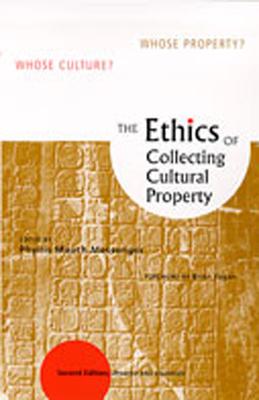The Native American Graves Protection and Repatriation Act (NAGPRA) has brought into sharp relief the conflicts among public and private collectors, scholars, and indigenous peoples over the provenience and disposition of cultural property, especially archaeological remains. First published in 1989 and now updated and enlarged, The Ethics of Collecting Cultural Property explores the ethical, legal, and intellectual issues related to excavating, selling, collecting, and owning cultural artifacts. Twenty-two contributors, representing archaeology, law, museum administration, art history, and philosophy, suggest how the numerous interested groups, often at odds, can cooperate to resolve cultural heritage, ownership, and repatriation issues and improve the protection of cultural property worldwide. A new preface and epilogue frame the contemporary debate in a global perspective. The editor provides updated information about domestic and international laws and regulations and enforcement institutions. She has also added "Codes of Ethics" and "Some Organizations and Resources Related to Archaeology and Cultural Heritage Issues."

The Ethics of Collecting Cultural Property: Whose Culture? Whose Property?
The Native American Graves Protection and Repatriation Act (NAGPRA) has brought into sharp relief the conflicts among public and private collectors, scholars, and indigenous peoples over the provenience and disposition of cultural property, especially archaeological remains. First published in 1989 and now updated and enlarged, The Ethics of Collecting Cultural Property explores the ethical, legal, and intellectual issues related to excavating, selling, collecting, and owning cultural artifacts. Twenty-two contributors, representing archaeology, law, museum administration, art history, and philosophy, suggest how the numerous interested groups, often at odds, can cooperate to resolve cultural heritage, ownership, and repatriation issues and improve the protection of cultural property worldwide. A new preface and epilogue frame the contemporary debate in a global perspective. The editor provides updated information about domestic and international laws and regulations and enforcement institutions. She has also added "Codes of Ethics" and "Some Organizations and Resources Related to Archaeology and Cultural Heritage Issues."